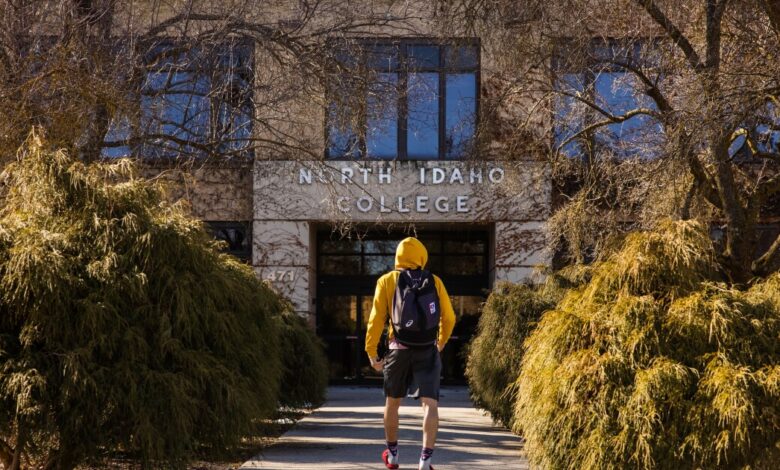Could North Idaho College Really Lose Its Accreditation?

[ad_1]
Abolish race-conscious practices. End “leftist indoctrination.” Fix what’s wrong with higher education in America. Those have been the long-stated goals of Republican governors, lawmakers, and activists who, empowered by voters and operating under state law, have for decades sought to remake the ideological climate on college campuses by taking control of the boards that govern public institutions.
But what happens when the actions of these boards violate long-established rules and norms regarding institutional governance, and in turn begin to imperil a public university or college’s financial and operational well-being?
That’s what could happen at North Idaho College, a 4,500-student community college that sits 13 miles from the state’s northwestern border. After three years of board interference and dysfunction, it now finds itself facing down a threat from its accreditor of a “show-cause” sanction — which would functionally be a final warning to the college to shape up or risk termination of its accreditation from the Northwest Commission on Colleges and Universities.
And it’s the board itself that has put the college’s accreditation at greater risk. In a Dec. 17 letter, the commission warned that “recent and subsequent public actions” of the college’s board “appear to place the institution at significant risk of being out of compliance with a number of NWCCU Eligibility Requirements and Standards.”
Without accreditation, students enrolled at the college would be ineligible to participate in federal financial-aid programs to pay for their education there. For most institutions, this loss of access to federal dollars functionally serves as a death sentence. The “show-cause” threat follows a warning letter from NWCCU last April.
Since 2016, only two public institutions of higher education in the mainland U.S. have ever been targeted with a “show-cause” sanction by their institutional accreditor, according to a Chronicle analysis.
Now, uncertainty abounds. Will the threat of accreditor action curtail the board’s penchant for casting aside presidents? And, if not, will the commission actually withdraw the institution’s accreditation, even if it means the end of North Idaho College? And how will other interested parties — like state regulators and legislators, future insurers, crediting-rating agencies, the U.S. Department of Education, and even other accreditors — factor in?
What higher ed can count on, said Sondra Barringer, an assistant professor of higher education at Southern Methodist University, are more standoffs like the one at North Idaho College between activist-minded boards at public colleges and the organizations that accredit those institutions.
No one knows where the next showdown will break out. But another board-governance affair reminiscent of the NIC saga played out at New College of Florida on Tuesday. A new board majority — appointed by Gov. Ron DeSantis to remake the institution into a “Hillsdale of the South” that rejects “trendy” political views — voted to fire the college’s president, and replace her in the interim with a former Republican Florida House speaker and close DeSantis ally.
‘Deep State’
The story of how this small Idaho college came to the brink of losing accreditation goes back a ways, but the roots of the latest chapter can be traced back to the ouster of Rick MacLennan, the then-president of five years. NWCCU issued a warning letter in April 2022, citing “persistent issues with governance at the institution” and alerting the college’s board that it was out of compliance with the accreditor’s policies. Around the same time, the Idaho State Board of Education appointed three new trustees to the college’s board to restore a quorum until November, when the three seats would go up for election.
The three state-appointed trustees were seated alongside incumbent members Todd Banducci and Greg McKenzie, who had both voted to fire MacLennan without cause — an apparent counterstrike against the “NIC ‘deep state,’” which Banducci had previously described in an email to a student.
The three new appointees, who formed a new majority, also did not sit well with Banducci, who essentially characterized the move as a hostile takeover of the board he chaired.
“They are moving at lightning speed to cram it down our throats!!” Banducci reportedly wrote on his Facebook page. “They are trying to take it out of the hands of the voters. Pushing through their agenda via bureaucratic fiat.”
Over Banducci and McKenzie’s objections, the new board moved quickly to appoint Nick Swayne, the executive director of a Virginia-based partnership between the state’s eight public universities, as North Idaho’s new president. He replaced Interim President Michael Sebaaly — who had gotten an unusual promotion, thanks to support from Banducci and McKenzie, from college wrestling coach to college president.
Newly aggrieved, Banducci, McKenzie, and their allies set their sights on restoring their board majority come election time. But first, their coalition would need to assuage any concerns that voters might have about the college’s accreditation. McKenzie argued in a campaign missive that any talk of accreditation loss for NIC was overblown.
“What about accreditation?” McKenzie reportedly wrote before the general election. “Isn’t it still at risk? No, that was Fake News. Accreditation has never been ‘at risk’ and the only remaining item on the accreditation agencies request list is to hire a full-time Vice President, anticipated to be completed mid-November.”
Art Macomber, a local lawyer and failed Republican attorney-general candidate, echoed similar sentiments in a Coeur d’Alene Press guest column published before the election.
“The scare tactic complaints about NIC’s accreditation seem to be a smokescreen,” Macomber wrote.
Banducci and McKenzie needed just one of their three preferred candidates to win at the ballot box in order to re-establish their majority on the five-seat board. And despite a $140,000 campaign war chest backing a slate of candidates endorsed by the regional Chamber of Commerce, Banducci and McKenzie were in the end able to secure their all-important third vote.
Not wasting any time, at a December 8 board meeting, Banducci, McKenzie, and newly elected Mike Waggoner voted to immediately place President Nick Swayne on administrative leave (he promptly sued, looking to be reinstated).
Critics alleged the board’s action had violated Idaho’s open-meetings law, a violation that the board would concede to in a meeting later that month. Macomber, who by this time was the college’s newly hired lawyer, said the move to place Swayne on administrative leave would allow the board to “investigate things that have arisen of concern that impeded our accreditation success.”
A Rare Move
Ironically, North Idaho College’s decision to place Swayne on leave gave rise to new anxieties about its accreditation.
On December 17, NWCCU penned a letter to the college’s leadership, raising for the first time the prospect that a “show-cause” order could be issued against the institution for its ongoing lack of compliance with the accreditor’s policies. “Show-cause” orders are a relative rarity in higher education, and are almost never levied against public institutions like North Idaho College.
According to a Chronicle analysis, of the 745 “show-cause” orders issued by institutional accreditors since 2016 and on file with the Department of Education, only two mainland public institutions of higher education have ever received such a sanction: Cheyney University of Pennsylvania, a four-year historically black university which had struggled financially in the past (Cheyney’s accreditor has since removed all sanctions against it); and Learey Technical College, a Florida vocational school that is now a part of the Hillsborough County Public Schools system. (All 11 campuses of the University of Puerto Rico were also issued “show-cause” findings in early 2019 after each failed to submit certain financial and regulatory items to the group’s accreditor).
Responding to the accreditor’s letter, North Idaho wrote last month that it had taken numerous steps to rectify issues of noncompliance, such as allowing public comment during regular board meetings. But the board rejected the recommendation of two of college’s administrators, who were then acting as interim chief executives, to bring Swayne back; the board majority cited Swayne’s lawsuit in justifying their refusal.
Instead, the board’s 3-2 majority voted to make Greg South, formerly an interim dean of instruction at NIC, the college’s latest acting president. Under the auspices of the Swayne lawsuit, Macomber issued more than a dozen subpoenas to college employees, former trustees, and others, according to reporting by The Coeur d’Alene Press. The Coeur d’Alene Press also learned that under Macomber’s arrangement with the college, the lawyer may bill it $325 an hour for his legal services. In December — his first month on the job — the institution paid him $25,000, according to invoices obtained by the paper.
In addition, the credit-ratings agency Moody’s Investors Service decided in late December to place the college’s $7.9 million in debt under review for a possible downgrade, which would make it more expensive for the college to borrow money. In its assessment, Moody’s noted that the dysfunction on the college’s board had resulted in the loss of its insurer. A downgrade could come soon, unless the college demonstrates “meaningful steps taken to stabilize leadership and address accreditor’s concerns,” the notice stated.
“The board members’ very public disputes with one another, college leadership, and external parties are negatively impacting NIC’s brand, which in turn, could negatively impact student demand and operations,” the analyst for Moody’s wrote.
To date, Moody’s has not downgraded its ratings for the college or its debt.
Sonny Ramaswamy, the accreditor’s president, said the commission had not yet prepared a response to the college, which formally replied to the “show-cause” threat on January 4. Ramaswamy declined to answer any specific questions about the college’s accreditation.
Echoing answers he provided to state legislators’ questions last week, South, the new interim president of the college, said in an interview with The Chronicle that he was focused on working with the commission to bring the institution back into compliance with the accreditor’s policies, though he repeatedly noted that NIC remains accredited. South also said that Ramaswamy had advised the college’s leadership to focus on educating students, and avoid speculating on what might or might not come next for the institution.
As for the challenge of working productively with a deeply divided board, South said he believed the trustees were committed to developing relationships and building trust.
“If they weren’t committed to it, I probably wouldn’t have taken the job,” South said.
The Chronicle requested interviews with Banducci, McKenzie, Macomber, and the other board members. A spokesperson for the college offered to forward emailed questions to the group.
In response, McKenzie wrote that the entire institution — board, administration, and employees — were committed to meeting the commission’s expectations. Asked if he bore any responsibility for putting North Idaho College at increased risk of losing its accreditation, McKenzie said he did.
“Everyone in leadership shares responsibility in where the college is at and where we need to go,” McKenzie said. “Being a member of the board governance team and having the accreditation issues relate to governance[,] I share responsibility. Pointing fingers isn’t what our students nor this college needs right now.”
In keeping with Ramaswamy’s advice, Tarie Zimmerman, a trustee in the minority, wrote that the board had not discussed any plans for how the college would respond if NWCCU actually did terminate the college’s accreditation.
Nothing In Between
Board members overseeing public institutions of higher education are increasingly assuming that their roles extend beyond the traditional portfolio of fiduciary responsibility and long-term strategic management, said Barringer, the professor at Southern Methodist. In some cases, it’s activist-minded boards motivated by ideological objectives. But Barringer also pointed to examples of board-president conflicts that arose from interpersonal disputes, like at Texas Southern University. In 2020, the university’s board voted to give themselves the power to fire any and all campus employees, a month after placing its then-president on administrative leave.
Because public colleges and universities like North Idaho College so rarely test the limits of their relationships with accreditors, what happens next at the institution will likely provide valuable insight into how much upheaval a body like NWCCU is willing to accept before it completely loses trust in a governing board. “We don’t have a line in terms of how far activist boards can go, and this could help establish a line for this accreditor in terms of how far it is willing to let the board go,” Barringer said.
And each possible move by the accreditor can in turn beget a different series of options available to the college, said Robert Kelchen, a professor of education at the University of Tennessee at Knoxville.
Withdrawing accreditation is a significant step that would carry risk for North Idaho, its students, and the commission itself. Kelchen said he suspected that even if the accreditor were to issue a “show-cause” sanction against North Idaho, it would not go beyond this step and actually cut off students’ access to federal student-aid dollars. Despite all the different names for different types of sanctions, Kelchen said accreditors actually only have a limited number of tools to tame board behavior.
“The tools in their arsenal jump from rubber mallet to sledgehammer. There’s really nothing in between,” Kelchen said. “They can require a bunch of documents to be provided. They can require a plan. But at the end of the day, you are either accredited, or you’re not.”
But even if the commission were to withdraw accreditation, North Idaho would still have options. It could file a lawsuit to compel reaccreditation, or rely on allies and sympathizers in the media, within Congress, at the Idaho Legislature, or on the federal committee that evaluates accreditors to pressure the commission to restore the institution’s access to federal aid.
The college could also elect to shop around for a new accreditor, Kelchen said. But that’s no guarantee, either. And even if a different accreditor did accept North Idaho College’s membership, could the board finally bring itself to follow the rules?
[ad_2]
Source link






